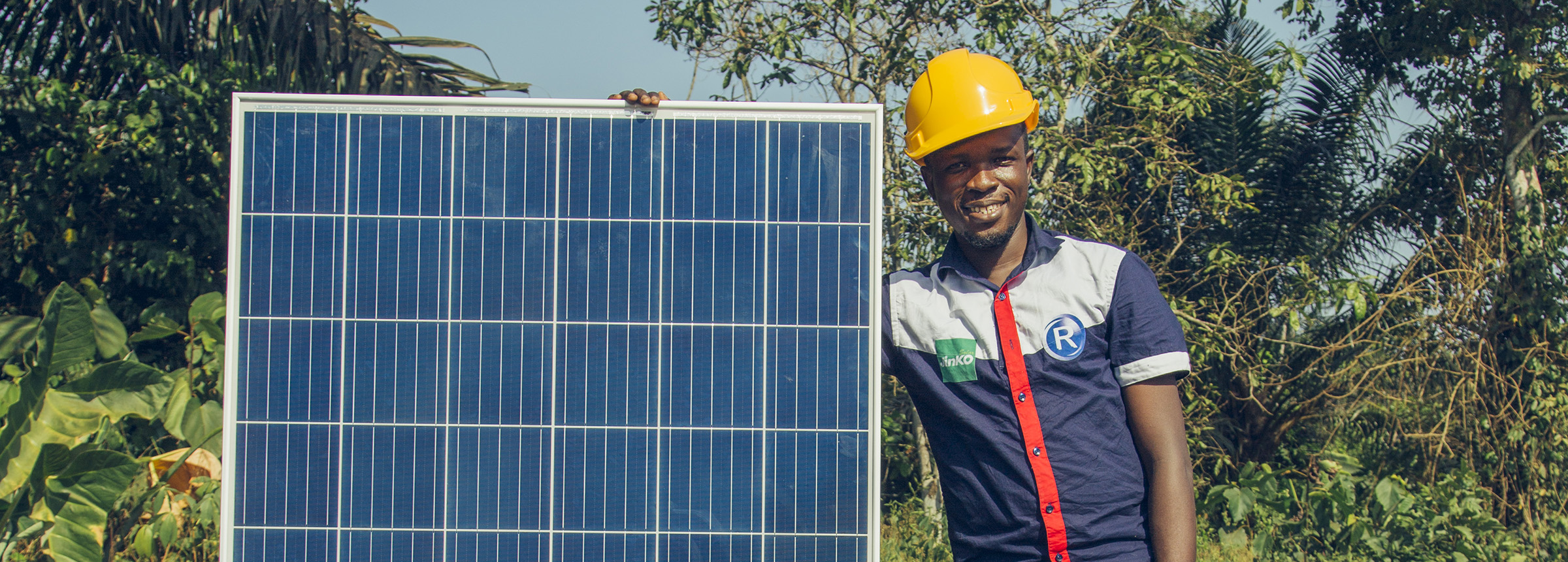
Power Switch
Less than half of Nigeria’s 186 million people have access to electricity. But in the rural village of Gbamu Gbamu, newly installed utility poles and wires act as markers of a brighter future, powered by a new solar minigrid. The grid, an effort of local developers Rubitec Solar and Winrock’s USAID-funded Renewable Energy and Energy Efficiency Project (REEEP), is empowering citizens and their enterprises, providing them with a better quality of life and more stable sources of income.
Lateef Jimoh knows that a certain amount of legwork is always going to be a part of his job. As a tailor, Jimoh typically takes orders from his fellow villagers and then makes the four-hour round-trip journey to Lagos to pick up the fabric he needs. But he would love to elimate the bumpy motorcycle trips he takes twice a week to pick up diesel for the generator that runs his six sewing machines. Besides enjoying a quieter work environment once he replaces the diesel generator with electricity from the solar-powered minigrid, Jimoh expects to have more money in his pocket. “It cuts down the expense with the power and having to travel to town to buy fuel,”says Jimoh, who moved to Gbamu Gbamu from Ghana to be closer to family eight years ago. “It will boost my business and make me produce more.”
The Cocoa Farmer
Through his years as both a farmer and a buyer of cocoa beans, Alimi Issa has learned that weather plays a big role in his success. On clear and warm days, he can rely on the sun to dry his beans, whereas the rainy season brings the risk that they’ll spoil. But the uncertainty and risk that he’s faced for years will disappear with the arrival of the solar-powered minigrid in Gbamu Gbamu. Issa plans to buy a machine that dries the cocoa beans, allowing him to both dry his own crops and charge other farmers to dry theirs. “I don’t need to wait for the sun to come out,” says Issa, who sells his beans to the agribusiness Olam, which ships them to Switzerland to be made into chocolate. “I buy the newer drying machine and farmers will carry their cocoa to me and I make extra money.”
The Entrepreneur
On a sunny November day, Lawal Omuwomi has ample time to show off the large blue cocoa dryer she helps run. Once Omowumi’s dryer is in demand again, she will no longer need to fetch diesel to power the generator that keeps it running, thanks to Gbamu Gbamu’s solar-powered minigrid. She also sees how a constant supply of electricity will keep the laptop and printer in her office running smoothly, another potential boost to her business. But while Omowumi is eager to reap business benefits, she is equally excited for the respite the minigrid will bring from Nigeria’s hot nights. “Normally, villagers sleep outside. But when there is [solar-powered] light in the midnight they will have fans and sleep there,” she says, pointing to the interior of a nearby home. “They sleep inside and enjoy themselves.”

